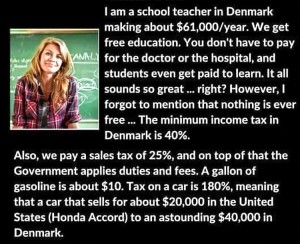Not sure why I like this song, but I do. Maximum volume, bass up!
Day: March 29, 2016
So Denmark is the happiest country in the world, right? With free education, free childcare, free health care, early retirement …
Except, of course, none of those services really is free. Doctors don’t work for nothing, hospitals aren’t built for nothing, teachers expect to be paid.
Free means either someone else is paying for it – lucky for you, not so lucky for the person who is paying but not getting the service. Or you are paying for it in ways that are hidden, usually through taxation.
In Denmark, the happiest nation in the world, 11% of the adult population regularly take anti-depressants. The suicide rate has averaged 20.8 per 100,000 people for the last five decades – one of the highest rates in the developed world, more than twice that of Australia or the US.
Between income tax, sales tax and other duties, Danes pay to the government an average of 80c out of every dollar they earn. They pay the highest prices in the developed world for electricity. Because of this, businesses in Denmark cannot compete. They either go bankrupt or move. Most Danes will never own their own home.
Happiest country in the world? Not quite.
Now that I am starting to post again regularly, I thought I would check traffic figures to track growth over the next few months.
Unique visits over the last month hovered between 2,000 and 2,500 per day, or 52,000 per month. Each visitor reads 3.4 pages on average, meaning nearly 200,000 page impressions per month.
It is not up there with the real heavy hitters like Instapundit and Andrew Bolt, but it isn’t bad for an independent blog which has been largely neglected for the last twelve months. Onward and upward!
A great book. You’ll know everything about everything when you get to the end. Buy it!
A dazzling speech by James Delingpole to the meeting of the World Taxpayers’ Associations in Berlin.
This is a sample. Read the whole thing.
Last year Climate Change Business Journal – calculated that the total annual spend on the climate change industry is $1.5 trillion a year.
All those carbon traders, climate researchers, renewables and biofuels experts, environment correspondents, professors of climate science at the University of East Anglia and the Potsdam Institute, sustainability officers on local councils, and so on, add up the cost of their grants and salaries – and $1.5 trillion per year is the ballpark figure you reach.
So what does $1.5 trillion look like in a global economic context?
Well, it’s roughly the amount we spend every year on the online shopping industry.
$1.5 trillion on the global warming industry; $1.5 trillion on the online shopping industry.
But there’s a key difference between these two industries.
One exists to provide buyers and sellers what they want – to their mutual benefit; the other is a sham.
Buying stuff on the internet: it’s really useful, isn’t it? It has had a dramatically transforming effect on our quality of life, the way you can order a book at 11 o’clock on a Sunday night and have it appear on your doorstep the very next day.
But how did this marvellous industry spring up? Was it because of all the special incentives and tax breaks granted by wise governments? Nope of course not. They weren’t necessary. The online shopping industry sprung up and grew and grew because it was what people wanted, where they chose – of their own volition – to spend their money.
Now compare and contrast the global warming industry – which I call a Potemkin industry – because that’s what it is: a fraud; a sham; a conspiracy against the taxpayer.
Do you want to have a guess how much that industry would be worth if it weren’t for all the money funnelled into it via government grants and taxpayer levies and subsidies and regulatory capture?
Pretty close to zero, I’d say. Take wind farms – my hobby horse. The cost of intermittent, unreliable wind energy is roughly twice the market rate for onshore wind; three times the market rate for onshore. Nobody’s going to pay that kind ofmoney in the open market. The only way it’s going to happen if people are mandated by the government to do so: which is what of course has happened across Europe and in the US.
Warren Buffett has said it: “wind farms don’t make sense without the tax credit.”
They’re inefficient; they kill birds and bats; they spoil views; they’re environmentally unfriendly – rare earth minerals from China; they’re hazardous; they’re expensive; they’re ugly (well I think they are….)
And in few countries is the damage these monstrosities have done more obvious than in Germany, home of the hateful Energiewende.
Energiewende means Energy Transition. It has been a disaster.




